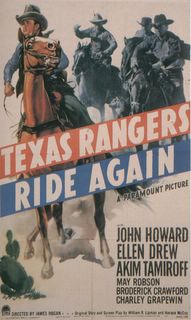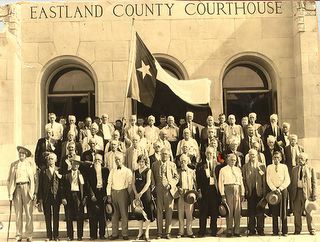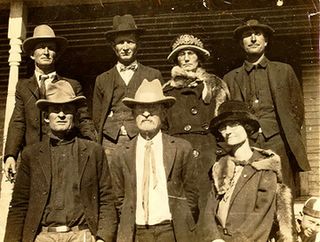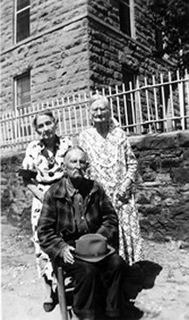
Texas Rangers
Among some of my favorite discoveries while digging in the family boneyard, the surprise finding of my great great grandfather Routh stands out. My dad's mother never really knew her own father or grandfather. All I knew previously of the mysterious "Mr. Routh" was that the mention of his name caused a frown on my grandmother's face. Not for years would the dirty laundry about a father who abandoned his children be shared with me through the magic of internet geneology sleuthing.
The Rouths were Missourians who moved to Brownwood, Texas in 1873 after a short stay in Collin County, Texas. Indians were annoying the settlements and raiding the scattered stock ranches, and in 1873 at the age of 19, R.D.Routh (my great great grandather) joined the Texas Rangers . The photo below, courtesy of my cousin, Sue Seibert (website here), was taken at a reunion for old Rangers. I don't have the exact year, but I would guess it is in the early 30's, and obviously in Eastland, Texas. R.D. Routh is the fifth gentleman from the right, second row (has a red mark next to his left chest area).

Ranger Reunion
In the year 1874, an outlaw by the name of
Now, I couldn't tell you if my great, great grandfather was part of the posse that began the hunt for Hardin, but certainly he was a Ranger at that time, and he lived in Brown County, so it would stand to reason he might have played a very small part. I would surely love to be able to sit a spell with Robert Devon Routh and hear about his years as a Texas Ranger. He had to be a character to name two of his sons Amazhar and Lord Byron "Kaiser". Later in life, R.D. was a jailer for the Brown County Jailhouse.

Brown County Jail

This photo is of Amazhar (left center) and R.D. Routh (right center) in 1940. Courtesy of Sue Seibert
My Routh ancestral history knowledge is sketchy, but from all accounts, Amazhar signed over his parental rights to my grandmother and her sister for $200.00 and hopped a train out of town. He later remarried a spinster telephone operator and lived out the remainder of his life in Blanket, Texas. This other family, according to a distant cousin, did not ever speak of "Uncle Em's" past, the children and wife he left in Santa Anna. Seems it was always a mystery. This link to the
I wonder what would make a man give up his two little daughters, and never speak or write to them again? These photos and the family history would never have been mine if not for the magic of the internet. What would R.D. Routh say if he knew that in the year 1999 (when I found the cousin and the site), his great,great granddaughter would gaze upon his picture and learn the sad tale of his son's desertion of family through such a medium as the world wide web?
As a final note, before my grandmother lost herself to Alzheimer's, I was able to share with her the information and photographs I copied from the website. Grandmother had lost nearly all her vision many years ago to a genetic condition called premature macular degeneration. Her eyesight was very poor, but she seemed to be able to see a small part of the pictures. She did not appear bitter, just both happy and a little sad. Happy to hear all this new family history, sad to have never known her own paternal grandparents.

R.D. Routh and children (Amazhar is far upper left). Courtesy of Sue Seibert
*UPDATE
I received this story from my Routh cousin, Sue, recently. The clipping was from the Brownwood Bulletin, I believe. I will have to check on the year, but probably in the early 1940's:
If you want to know the history of Brown County, drop around some day to 210 North Broadway Street, and talk to Bob Routh. Mr. Routh is one of the oldest living settlers of Brownwood. He came here in 1872, when this city was a hamlet of seven or eight log houses.
"Was Brownwood one street then?" he echoed my query. "It was even less than that. The Brownwood of 1872 consisted of two stores built from undressed timber, a log courthouse, and about five dwellings. The business section of the twon was in the bend of the Slough where the old jail now stands. The residences were scattered out for about a quarter to a half mile from the business houses.
"As for the surrounding county, it was sparsely settled. As well as I remember, there were only 56 families in the county when I came here. There were the Andersons and Williamses, the Cheathams, and others."
Mr. Routh was born in Collin County February 23, 1854. When he was eighteen, he decided to move into a less settled section of the country, and made the journey from his home to this city by ox wagon.
"It was slow going, and a tedious way of traveling, " he said, "but it was the mode in those days. There were very few horses in Texas when I was growing up. Horses were scarce then even in the cattle country.
"And this section was cattle country. When I came here there was about twenty acres in cultivation in the whole county. Old Uncle Bill Anderson had a ten acre patch out at his place, and someone else had a small farm near town.
"Brownwood was better off in a lot of ways then, because this country is naturally cattle land. It should never have been cut up into farms.
"As for money, there was little of it. But none of us ever suffered."
I wanted to know about the Chisholm Trail. "Did it go through Coleman County, as some say?"
"No, the Chisholm Trail never did go through this part of the state. It started on the Chisholm ranch which was located in Wise County and went up into Indian Territory. It branched into two main routes, one of these went to Kansas and Dodge City, while the other one went to Denver, Colorado. Cattle were driven into Kansas and sold to the packing plants, cattle driven to Denver, and sold to western stockmen.
"There were a number of cattle trails in this section of Texas, but all of them, so far as I know, were unnamed. There was one trail which started in southern Texas, came up through Brown County (it passed the old Round Mountain on Salt Creek) and went on north through Callahan County. This trail may have merged later on along the route with the Chisholm, that I don't know, but what I do know that the Chisholm Trail was never south of Wise County.
"I could show you where the old Chisholm Trail passed if we were in Wise County. I could find the Chisholm easily, for I have been upon the Chisholm ranch many times. A brother of mine used to ride ranger there."
"I joined the Rangers here in 1873. There were 75 men in our company, and we were detailed for Indian duty, but I was never in an Indian fight.
"Bill Williams came to town one day for supplies and when he returned to his ranch which was located on the Jim Ned, he found his wife dying. One of the children was dead, and the other had been carried away. It was presumed that a party of Comanches had committed the depredation.
"The last Indian fight in Brown County occurred in 1875. It took place on Clear Creek, and Dick Cheatham and Dick Smith, as well as some other local men ran across a raiding party of Comanches. The fight was short duration, and the Indians were killed; one of them was brought into town and left at Dave Hutchinson's blacksmith shop, where he was kep on exhibition for a day. He was then taken out, and stuck up in a tree along the old Comanche road. A few days later he fell out of his perch and was eaten by the roaming hogs.
"Most, if not all of the raids, in this section were carried out by Comanches. The tribes camped on the Pease River, and the braves would set out at various intervals after horses. They would scout over this part of the state and would even travel as far south as Bell County after mounts. They wanted animals much more than they wanted scalps.
"Regardless of what people say, the Indian was never bad at heart. The white man did his best to make him bad, and partly succeeded. The white man crowded the redskin into the Pacific Ocean; he stole his land from him; he made him promises and he always broke them. It has always been the great failing of the white man that he had no sympathy for primitive peoples; greed seems to be paramount in his nature.
"Shooting scares were common here in the seventies and were no rarity in the eighties either. Men considered killing to be the easiest and most effective way to settle quarrels. As a rule they had nothing to fear from the law because they were usually acquitted when they were tried.
"I can count them out, one after another, the men who killed and were killed. There was one old man who killed once too often. He shot his brother-in-law, and carved a second notch on his gun. A shoot.....grain in the morning and go to picnic in the afternoon.
"I knew a ranger here named Captain James. He was a first cousin to Jesse and looked as much like the bandit as a twin brother. He showed me a picture that he and Jesse had taken together before the captain left Missouri.
"James went down to the Bayou bridge one day to arrest a man who was camped there. I forget what charge the man was wanted for. He appeared to be peaceable enough and told James that he would go back to town with him. He requested that he might get his coat from the wagon. James consented to this. The man went tot he wagon, reached under the seat, drew a gun, and fired at James. James was hard hit, but he fired back, killing the stranger. A ranger who was with James carried him to town, and after a few months, the captain recovered from his wound.
"I saw Captain James at a ranger reunion five years ago. Whether he has died since then or not, I don't know.
In 1879 Mr. Routh married Miss Rosie Cane*. Six children were born to them, all of whom are living.
*The spelling was Cain, and could possibly have been Crain/Crane.

R.D. Routh and sisters, Mattie Routh Knight Inman and Molly Routh Faulkner in front of the Brownwood Jailhouse in 1941. Courtesy of Sue Seibert

3 comments:
Such rich history! "...the indian was never bad at heart." I always believed this.
Excellent photos.
This inspires me to write about my great-grandfather,(and his Irish descendants) who's childhood home still stands a quarter mile from where I sit now; built in the 1800s. I gotta' get it all together and then...
Thanks for the blog! My Grandmother was Nancy Jo Routh, Daughter of Lillian "Marie" Routh. Lillian Marie Routh was Lord Bryon's Daughter. :D
Nancy Jo died before I was born so I know nothing of the family.
Anonymous
Hey, cuzzin!
Please write to me
cowtownpattie@gmail.com
Post a Comment